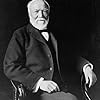To answer questions about
The Library Book,
please sign up.
Robert Blumenthal
Actually, the theme of each of the books listed appeared in some form in each of the chapters. I think it was just a clever way of showing how we use the library for reference.
Todd Glaeser
They may not always relate to the subject matter, but there is always a mention of the topic of the book, mention of the book, or a play on words concerning the topic of the reference.
I looked at them as a kind of summary of the chapter of sorts, like early novels would summarize the chapter in a couple of sentences at the start of the chapter
I looked at them as a kind of summary of the chapter of sorts, like early novels would summarize the chapter in a couple of sentences at the start of the chapter
Judy
At first, I thought they were books that had been lost in the fire but quickly ruled that out when I noticed the publication dates. It was a bit distracting to me because I kept thinking there was a significance to the titles that I was missing. Ultimately, I'd have to agree that it probably represents the variety of books available. She writes near the end of the book: "The library is a listening post. You don't need to take a book off a shelf to know there is a voice inside that is waiting to speak to you, and behind that was someone who truly believed that if he or she spoke, someone would listen."
Angie
At a talk I recently attended, Susan Orlean explained that "This is going to feel like you're in a library--you pull out a book about arson, then you put it back, then you pull out a book about..." something else (e.g. book burning, map cataloguing, social services, etc.), and then come back to the story about the fire. Therefore, similar to other responses here about what one might find in the stacks at the library, but with relevance to that particular chapter's contents and in relation to the fire.
Roz
I am sure there is a real and important answer but I just thought of it as relating to the way we library lovers wander down an aisle and randomly shop for interesting titles.
Sarah Cawlfield
Like Robert said above, they actually do all relate in some way to the chapter. Sometimes the author mentions the book specifically, sometimes it's a little joke, and sometimes it's just what the chapter is about (like for the last chapter, the books were all titles about the end of the story.)
Ruth
The citations are thematically related to the content of each chapter. It struck me as a cute bit of packaging (like the fake library card and pocket printed on the back inside cover). Got old for me after the first few chapters.
Lynn Carr
I thought it was a unique way to recommend books that the author found in her research for this book.
Arimathea
To me they represented a very small sampling of what you might find in the open stacks of a good sized library. I didn't think there was meant to be a pattern.
Chris
Though the titles seemed relevant to each chapter and was a clever way of introducing that chapter's content, hearing the Dewey number read in audiobook format for each one felt unnecessary. It got to the point that I just wanted to skip through them.
Carolyn
It would have been helpful for the author to have addressed that in her notes. The significance is known only to her.
Nancy Agafitei
Did anyone else find the last entry for Chapter 31 humorous?
Sam
A couple of the books she mentioned some of the librarians reading or having on their desks, but I'm not sure about the rest. I was having trouble finding a pattern.
Kato Justus
I thought the significance of the book titles, authors, with the Dewey decimal designation included served several purposes.
It takes the reader on a casual stroll through the library. It’s the sort of thing you’d see if perusing the shelves.
It demonstrates the sometimes awkward way one thing leads to another. The weird way humans classify and refer to information. How many of us have go to the library targeting a specific book only to walk out with titles placed to either side, or something from a shelf above or below that caught our eye?
Although there were post-fire titles included it gives the reader an idea of the scope of loss from the fire. It that way, it was a bit like an obituary.
Finally, it was a tribute to her mother and her child. Those days spent in the library with her mom, and now as a parent doing the same with her own child. A beautiful bridge spanning the scope of generations in her life as well as their connection to all of humanity.
It’s just the way we meander through a library and how those unexpected titles “whisper” to us as we work our way through the “listening post.”
It takes the reader on a casual stroll through the library. It’s the sort of thing you’d see if perusing the shelves.
It demonstrates the sometimes awkward way one thing leads to another. The weird way humans classify and refer to information. How many of us have go to the library targeting a specific book only to walk out with titles placed to either side, or something from a shelf above or below that caught our eye?
Although there were post-fire titles included it gives the reader an idea of the scope of loss from the fire. It that way, it was a bit like an obituary.
Finally, it was a tribute to her mother and her child. Those days spent in the library with her mom, and now as a parent doing the same with her own child. A beautiful bridge spanning the scope of generations in her life as well as their connection to all of humanity.
It’s just the way we meander through a library and how those unexpected titles “whisper” to us as we work our way through the “listening post.”
Anita
I saw it as browsing through library shelves, with some relevance to the contents of the chapter.
freddie berg
Referred one of the titles to a colleague as a suggestion to help in his work. Instant call back, like hitting the target.
Michele
I thought it was a kind of bibliography. If you want to read more about libraries and fire, here is a list for you.
About Goodreads Q&A
Ask and answer questions about books!
You can pose questions to the Goodreads community with Reader Q&A, or ask your favorite author a question with Ask the Author.
See Featured Authors Answering Questions
Learn more

















